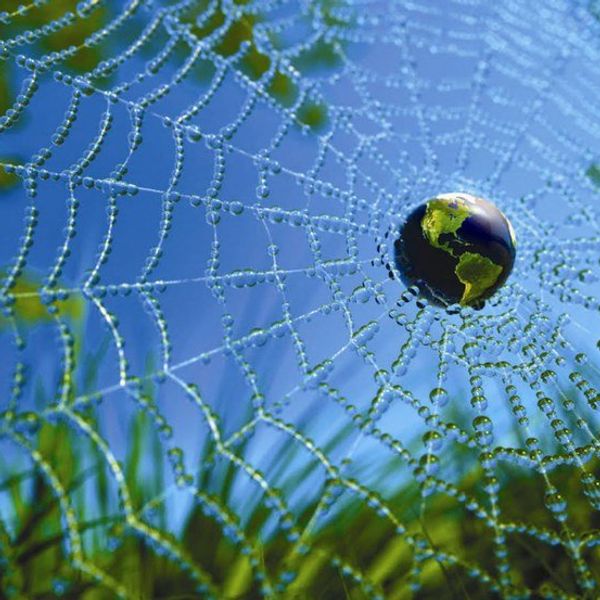I am a bioenvironmentalist with a foot planted in the social green camp, and a little faith that technology can be a force for good, and not evil, if heavily regulated and its energy put toward agroecology and only sustainable technologies. In order to adopt a mindset better suited to sustainable living, we need to increase our “earth awareness”—essentially our ability to think globally, and act locally.
Though I think it’s a little extreme to say that all life should be treated equally (i.e., never kill an animal, never pull a weed), I do think that as humans we need to recognize that anthropocentrism is what’s killing us, and that we are not the center of the universe but merely one of infinite species living on the planet. Humans as animals ultimately do not naturally contribute anything to the wellbeing of the planet; we therefore have a predisposition for unsustainability, selfishness, and greed.
Overcoming this unsustainability by attempting to undo years of globalized industrial damage will lead us on a path to a more democratized world comprised of localized economies, with lesser disparities between rich and poor; greater food security that will come with the replacement of industrialized agriculture systems with small-scale, localized, biodiverse farming practices; and significantly lower greenhouse gas emissions and subsequent planet warming.
Biodiversity is one of the most crucial components to productivity and sustainability. All agricultural, economic, and social processes should seek to conserve the diversity of life to ensure a sustainable human existence. Putting biodiversity at the forefront of the economic and political consciousness requires shoving industrialization and globalization to the back—or ideally, getting rid of it all together. This includes changing the very meaning of “progress.”
Capitalistic ideals are currently the only accepted means by which we evaluate development and production, which involves the praising of industrialization and land degradation (as well as high greenhouse gas output, though they don’t like to talk about that one) and the condemning of small-scale farms that seem to drag civilization back to ancient times of pre-industrialization because we’ve come to define progress by such superficial terms. In actuality, “progress” can and should be defined as biodiverse output from small farms, or “progress” in decreasing greenhouse gas emissions—rather than calling “progress” the building of an industrial facility on top of once fertile land that will now emit thousands of more tons of carbon into the air annually.
Though I would like to believe that industrialization and globalization allow for the efficient production and transport of food and goods to places in need, large industrial companies horribly degrade the environment and heavily prioritize their own profits over public and environmental health. Just 90 companies have caused the release of 63 percent of global greenhouse gas emission, and 30 percent of these emissions are caused by just 20 of these companies. These are also the companies at the forefront of the climate denial movement who continuously push for further industrial development at the expense of anyone and anything in their way.
Industrialization and land grabbing, especially in third world countries, not only contributes significantly to global warming and land degradation, but also the loss of infinite indigenous knowledge and sustainable systems of practice as a result of takeover by large facilities and monocultures filled with acres of GM crops. Industrialization, on a slightly different note, is horrible in adversely affecting poor communities, particularly minority communities in the United States with little political power and means by which to stop the construction of an industrial facility site being built essentially in their backyards.
These capitalistic values we’ve embraced also allow for patents on life forms and legal ownership of parts of nature itself, which only furthers the perception of the earth as a commodity to expend indefinitely rather than an entity with which we should be coexisting. This is not to say that a tree should never be cut down, or land never used for crop production, but we need to “use” as little as we need from nature in order to sustain our livelihoods and nutrition, not as much as we desire.
In addition, though I believe that with the right regulation and direction technology does have the ability to support and further develop sustainable practices, I don’t think its necessary and shouldn’t be implemented further if it doesn’t have to be, which it doesn’t. We can’t wait around for technologies to catch up to what biodiversity already can and does provide for small farmers all across the world. More “advanced” technologies only put a band-aid over the problems that need to be addressed from the bottom up. By relying on technology and industrialization we are only moving further and further away from both the natural resource sustainability (stability of agricultural ecosystems) and socio-economic sustainability (where human needs of livelihoods and nutrition are met) that are necessary for humanity to sustainably coexist with its surroundings.





















